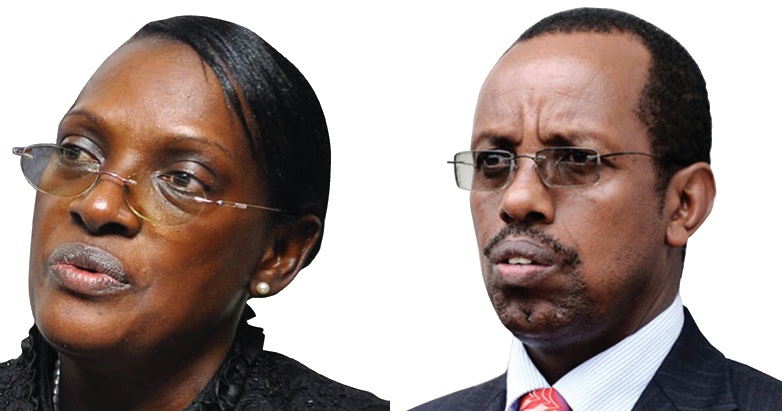
In the meantime, the bank was in a crisis, it had suffered loss of confidence, Crane Bank issues and had been facing serious failures of systems.
Mutebile was itching to make changes, save face, and redirect the bank.
It was not only him. The Independent has learnt that in one of the board meetings, one of the board members, lashed out at Kasekende directly.
“Why are you protecting criminals?” the board member asked.
But that would be his last board meeting. He was dropped from the board. His critics said he was senile. Insiders said he was eliminated for fighting the status quo. He is the only board member who was not reappointed.
Still, Mutebile went to work with a team of allies at the bank. They put together a list of transfers. The changes were kept a topmost secret.
Many at the bank had not expected him to return from sick leave abroad with the energy he did mid-January. And on Feb.7, he unleashed the memo with the proposed transfers.
Tempers flared. Many were caught off guard. For instance, Bagyenda had been on leave when the changes were announced. She confronted the Governor about why he had fired her immediately she returned to office.
Frustrated, she teamed up with other affected officials and petitioned the IGG.
Board backs Kasekende
Kasekende reportedly saw the Mutebile reshuffle as a slap in his face and elected to fight back—albeit clandestinely. He started with the board. Unlike Mutebile, Kasekende is a great lobbyist—makes time to sell his pitches to the board before hand by meeting them individually before a meeting.
It was not surprising, therefore, that the day the new board was meeting for the first time in February, they once again did not appear on the same side with Mutebile and advised him to reconsider the transfers.
While there have been tensions between Mutebile and Kasekende, the transfers were the high watermark of the complete collapse of their relationship. In the reshuffle, many saw Mutebile attempting to take charge of the bank again—taking it back from Kasekende. For Kasekende, the reshuffle appeared scuttling what had been built over the years, insiders say.
Several officials at the bank intimated to The Independent that from Mutebile’s perspective, the reshuffle was aimed at returning sanity at the central bank after it became clear that international advisors and the public were losing confidence in the bank.
The two men had worked together fairly well until 2015 when Mutebile’s contract was renewed.
The renewal was a major blow to Kasekende. At the time, Kasekende was almost certain of being appointed and Mutebile possibly did not like knowing that Kasekende was waiting for his job. This had strained the relationship of the two men. Fortunately for Mutebile, politics came to his rescue. With Amama Mbabazi contesting against Museveni, President Museveni figured dropping Mutebile, who comes from Kigezi region could cost him the Kigezi vote. He consulted about whether he could appoint him for only two years—until after the election—but was told it had to be five years. That is how Mutebile got a renewal for another five years and Kasekende lost.
Insiders say since then, the bank has been divided into two major camps—the Kasekende camp looking to eject Mutebile and the Mutebile camp looking to defend the governor at whatever cost.
The divisions mean that promotions are sometimes based on loyalty and not competence, and decision-making is impaired. Mutebile sought to reverse this trend with the latest reshuffles especially having seen how the trend has reportedly cost the taxpayer billions of shillings. The biggest damage, however, might be that the fight is further eroding investor and public confidence in the bank and the economy as a whole.
At the March 26 meeting, Museveni advised the BoU bosses to form a committee to resolve the issues. For some of them, like Bagyenda, the meeting possibly cemented their departure. But for others, like Kasekende, it remains unclear how the dice will fall.
 The Independent Uganda: You get the Truth we Pay the Price
The Independent Uganda: You get the Truth we Pay the Price



My concerns about the Central bank are over its management of monetary policy. Uganda’s currency is very week, ranked amongst the bottom 10 in Africa. For over a decade, interest rates have been and continue to be at double-digit. That has significantly curtailed investment in capital-intensive businesses which is central to job creation and long-term economic growth.
Economics has moved on since the days Mutebile was at Havard or wherever it is he studied. His solutions to steering monetary policy are obsolete and are in part contributing to high youth unemployment.
Uganda needs to reinvent the economy. It will require new thinking at the helm of the Central Bank.
Has this National bank the capacity to repay the accumulated international loans that seem to continue to raise as long serving politicians insist on governing the country as of right!
What if this country seems to want to go the way of governance by a State of Emergency and a Curfew so that the lives and properties of the citizens of Uganda are better protected. Will such a state of political affairs sustain the current stable economic affairs of this African country?
Under such undertones, how can an investor these days try to bring in good money for investment in this country and at the end of the day loose it all at the blink of an eye. Whom is he or her going to blame for such a loss.
Your insinuation of tribal changes by Kasekende wont fly in the Uganda we know. Many posts in government bodies are full of me and you.